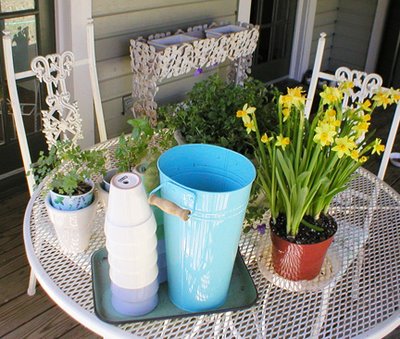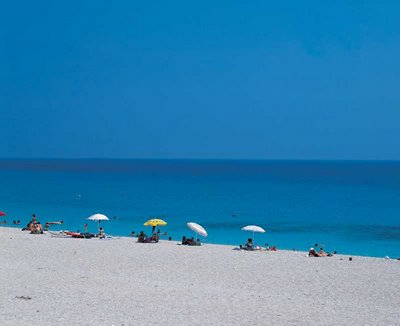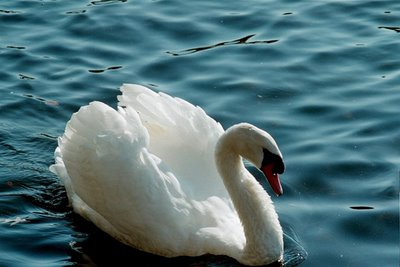The Uses of Enchantment

(According to Socrates,) we enter the mythical when we enter the realm of risk, and myth is the enchantment we generate in ourselves at such moments. More than a belief, it is a magical bond that tightens around us. It is a spell the soul casts on itself. “This risk is fine indeed, and what we must somehow do with things is enchant (epadein) ourselves.” Epadein is the verb that designates the “enchanting song.” “These things,” as Socrates casually puts it, are the fables, the myths.
-- Roberto Calasso, The Marriage of Cadmus and Harmony
THE USES OF ENCHANTMENT
May 9, 2006
Let’s see, the hour raw and too
early, my facts the usual sortie
of bulldozers crashing into Paradise.
It’s hot and still this morning,
everything shrill beneath a
marauding high pressure front,
the air high with crickets
& faintly acrid with the
smoke of distant brush fires.
I’m writing on like a monkey
in the the wind machine
of an indifferent age, amid
the thickening plethora of
health and money worries
with a faltering and failing world
crowing at the trough
for more toothsome blood.
All of that precisely why
I take such pleasure sitting here
in the brutal nascence of late night,
singing on a strand of
moon and noctal butterflies
and cats sleeping always nearby
and my wife curled in our bed
upstairs in the great feminine
sleep she is the dearest surface of.
Oh and how the garden shifts
from drinking that saturate
to press up close to me,
sighing More even as I would
shut the covers for good on
that wet indifferent wild, declaring
such things well enough spoken of
when I have barely begun to drown
in blue waters just outside
stronger and more strange than any
booze I have known, a chalice
of silver and hard-boned quartz
forever off my lips. There is a tide
which floods my facts with curves
& purrs & the poured nipples of
careens, not despite the difficulty
of long days (for that would ratchet
down the holy calibration), but
because the magic sea’s far
more inland than it seems,
crashing on a shore which
is yet cannot be, right here
between the saying and the said,
insatiably inside the hips of
my beloved’s softly booming No.
Ever between bereaving and bereft,
ever soon to rise and trudge on,
I am yet infused with a sweetness
I can never say or come to know --
a starry lilt of cold sweet jasmine
ferried on tarry boats of smoke,
the bite of exactly what’s dying
and the bit of heaven it releases
to swing voluptuously here, at
least, at last, so naked, soaked, and free.

THE MILK OF PARADISE
Jack Gilbert
On the beach below Spelunga everyone is
speaking Italian, lazily paradisal in the heat.
He tries to make something of it, as though
something were going on. As though there were
something to be found in the obvious nakedness
of breasts. He complicates what is easily true,
hunting it down. It matters disproportionately
to him to see the ocean suddenly as he turns over.
He watches the afternoon as though it had
a secret. For years he will be considering
the two women nearby who decide to get lunch
at the restaurant back by the cliff. The taller
one picks up her top and tries to get
into it as they start out. But it tangles,
and she gives it indolently to the prettier one,
who puts it on as they walk away carelessly
into the garnishing Mediterranean light.
-- from The Great Fires (1995)

JACK GILBERT AGAIN BY THE SEA
May 1999
Reading Jack Gilbert
again by the sea,
this time at Longboat Key
on holiday with my wife.
We lay in the shade of
a blue umbrella, so dazed
with heat we can barely breathe.
The Gulf beach so white,
an sheet ironed by the sun.
Far from that stormy beach
on the Atlantic three years ago
where I tried to get well
in a raging surge.
Yet today as then I read
Jack Gilbert's poems and find
the balm I need, his lines
washing me in waves
of indolent truth.
How I've searched for words
like his to say to water.
He looked down over
the sleepy Aegean
and saw an ocean inside
the making of his life.
So much must have seemed
the same: glitters spread
across the aching blue,
breezes clean and
supple as gauze.
In so few words he found
the exact sense of his
day at the ocean,
concealing how much
time and craft and courage
it takes to write on water.
Erasing all that is not heart
from seascape and day.
Today his poems
remind me that
the sea is only a page
impatient to turn and the
sun a shield
against all the things
we learn or else.
Unscroll the heart
in the gull slowly
crossing the scree.
Breathe the gently
passing day like a prayer
or the memory of grace.
Now grasp the pen lightly
and curve words into surf.
***
THE SWAN
Mary Oliver
Across the wide waters
something comes
floating—a slim
and delicate
ship, filled
with white flowers—
and it moves
on its miraculous muscles
as though time didn’t exist,
as though bringing such gifts
to the dry shore
was a happiness
almost beyond bearing.
And now it turns its dark eyes,
it rearranges
the clouds of its wings,
it trails
an elaborate webbed foot,
the color of charcoal.
Soon it will be here.
Oh, what shall I do
when that poppy colored beak
rests in my hand?
Said Mrs. Blake of the poet:
I miss my husband’s company—
he is so often
in paradise.
Of course! the path to heaven
doesn’t lie down in flat miles.
It’s in the imagination
with which you perceive
this world,
and the gestures
with which you honor it.
Oh, what will I do, what will I say, when those
white wings
touch the shore?


<< Home